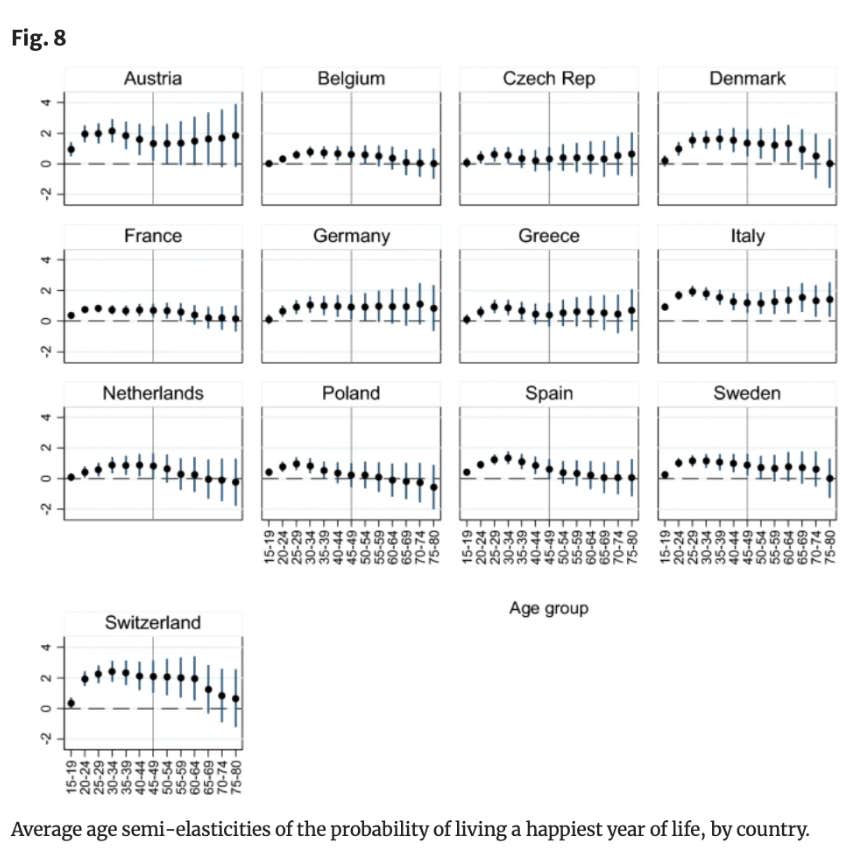Survey Of Older Adults Reveals What People Really Consider The Best Years Of Their Life
 goodluz | Shutterstock
goodluz | Shutterstock Spanish researcher Begoña Álvarez, with the Department of Applied Economics at Vigo University, conducted a study to determine which were the best years of older Europeans’ lives. Heads up: It's not your teens or 20s, despite what books, music, and movies might have you believe.
“This paper offers new evidence on the life-cycle pattern of happiness,” read the abstract. “A novelty of the analysis is that it exploits information on the period individuals recall as the happiest in their lives.” Interestingly enough, a similar survey of Americans found the numbers were almost identical. John Mellencamp and Bruce Springsteen might insist that the teen years were the "Glory Days," but the truth is, the best years come decades later.
A survey of older adults found that they considered ages 30 to 34 to be the best years of their lives.
According to the survey, ages 30-34 are generally regarded as the best years of your life, at least according to older adults. The data comes from a SHARELIFE survey conducted in 2008/09, which included 13 European countries among individuals aged 50 or more.
 almo Creative | Shutterstock
almo Creative | Shutterstock
Lead researcher Álvarez used a dataset spanning respondents' entire lifespans, restricting to ages above 10 years, despite the data showing those ages for descriptive purposes.
“Evidence from psychology and behavioral economics,” he said, “shows that how we remember and assess the past — in terms of subjective well-being — does not necessarily coincide with the feelings and emotions we actually experienced.”
The early to mid-30s are often remembered as the happiest time of life.
Álvarez wanted to capture that retrospective analysis of the decisions adults made in their younger years and reflect on the times in which they thought they were having the most fun. The data sample comprised 26,836 individuals who participated in either one or both waves of the survey.
The study authors wrote, “The estimates indicate that the likelihood of achieving the happiest period in life increases substantially between childhood and the ages of 30–34, where it achieves the maximum.”
The graph looked like an upside-down U, with younger ages ramping up exponentially until the maximum number of votes occurred around ages 30-34. The ages after that declined at a more linear rate.
 The Best Years of Older Europeans’ Lives | Social Indicators Research
The Best Years of Older Europeans’ Lives | Social Indicators Research
Even when including controls for sociodemographic characteristics, the pattern stayed relatively the same, only differing a little when you looked at different genders. Women had sharper inclines when nearing the age of 30-34, resulting in much sharper declines after the turning point. While men didn’t have quite the same incline, their older years declined more steadily, showing that men are happier people in the later stages of their lives in comparison to women.
“At this point, it is important to remark that individuals’ happiest periods are long on average: for half of the respondents, this period lasts two decades or longer,” the study reported.
Interestingly, an American survey conducted in 2021 and reported on by StudyFinds indicated similar results. A survey of 2,000 adults in the U.S. said that 36 is the best age, and if they had a choice, they would freeze aging in their mid 30s. Four in 10 respondents said they would hands down choose their 30s over their 20s as the best years of life.
The early to mid-30s are the sweet spot in life because they fall between youth and aging.
 Monkey Business Images | Shutterstock
Monkey Business Images | Shutterstock
The 30s are sort of a magical in-between decade. You feel good, you look good, and things in life are starting to fall into place. Careers become more settled, and money is more secure. Relationships are more established, and basically, the folly of youth and the uncertainty that goes with learning how to be an adult leave. Turning 30 means feeling more secure in oneself.
Psychologist Donna Dawson explained, “The age of 33 is enough time to have shaken off childhood naiveté and the wild scheming of teenaged years without losing the energy and enthusiasm of youth." She went on to say, "By this age innocence has been lost, but our sense of reality is mixed with a strong sense of hope, a ‘can do’ spirit, and a healthy belief in our own talents and abilities.”
If you lived through your 30s and didn't quite feel like they were your best years, that's okay, too. Every decade has its advantages, and every person has their own life experiences. Álvarez even concluded the study findings by stating that “there is no perfect measure of subjective well-being.”
Basically, happiness can be found at any age and at any stage of life. Perhaps your 40s will be your favorite or maybe even your 80s. Truth be told, we should be able to have multiple ages and times of life that are the best because life is filled with opportunities, which is why we have to and always should live by the late great Frank Sinatra's famed song, "The Best Is Yet To Come."
Isaac Serna-Diez is a writer who focuses on entertainment and news, social justice, and politics.

